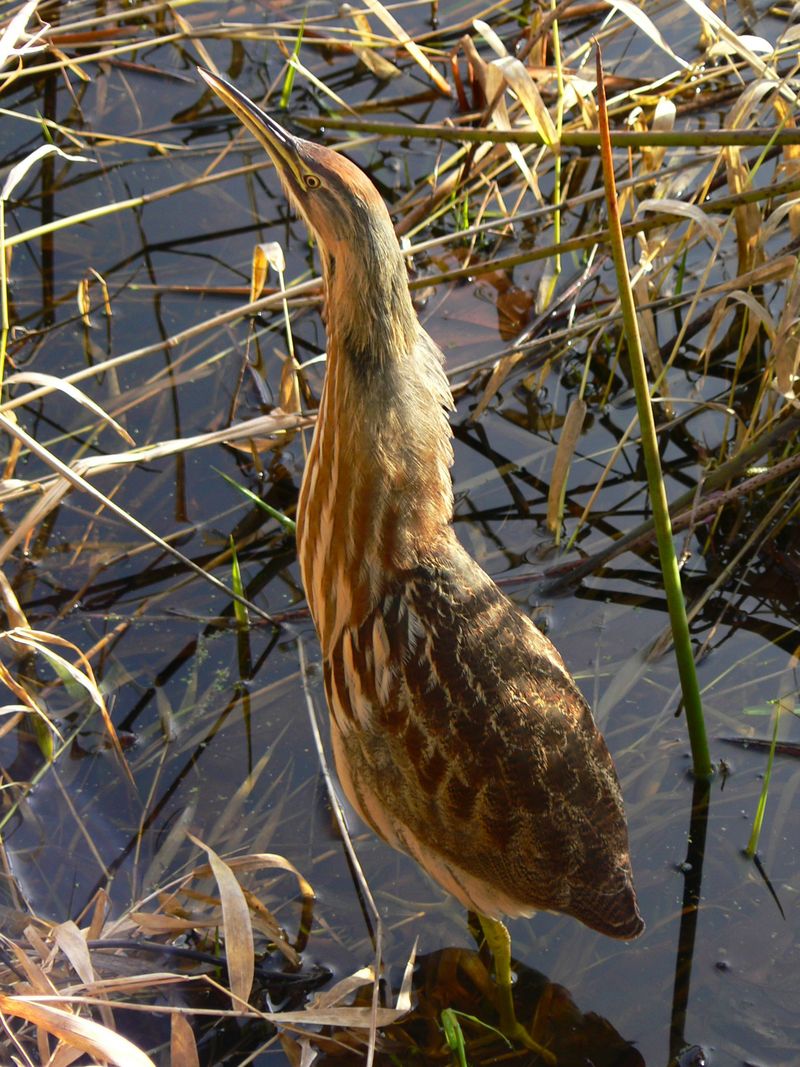|
| 질의: Botaurus stellaris stellaris | 결과: 21번째/30 | |
American Bittern (Botaurus lentiginosus) - Wiki
| 제목: | American Bittern (Botaurus lentiginosus) - Wiki
| |

| 해상도: 1920x2560
파일크기: 726503 Bytes
등록시간: 2007:09:22 02:58:50
|
American Bittern
From Wikipedia, the free encyclopedia
[Photo] American Bittern (Botaurus lentiginosus) at West side of Twin Barns Loop Trail, Nisqually National Wildlife Refuge. Photo ??2006 Walter Siegmund (http://en.wikipedia.org/wiki/User_talk:Wsiegmund). Copyright (C) 2006 Walter Siegmund
Permission is granted to copy, distribute and/or modify this document under the terms of the GNU Free Documentation License, Version 1.2 or any later version published by the Free Software Foundation; with no Invariant Sections, no Front-Cover Texts, and no Back-Cover Texts. A copy of the license is included in the section entitled "GNU Free Documentation License". |
The American Bittern (Botaurus lentiginosus) is a wading bird of the heron family Ardeidae.
It is a large, chunky, brown bird, very similar to the Eurasian Great Bittern, Botaurus stellaris. It is 59-70 cm (23-27 inches) in length, with a 95-115 cm (37 - 45 inch) wingspan.
Although common in much of its range, the American Bittern is usually well-hidden in bogs, marshes and wet meadows. Usually solitary, it walks stealthily among cattails or bullrushes. If it senses that it has been seen, the American Bittern becomes motionless, with its bill pointed upward, causing it to blend into the reeds. It is most active at dusk. More often heard than seen, this bittern has a call that resembles a congested pump.
Like other members of the heron family, the American Bittern feeds in marshes and shallow ponds, dining on amphibians, fish, insects and reptiles.
This bittern winters in the southern United States and Central America. It summers throughout Canada and much of the United States. As a long-distance migrant, it is a very rare vagrant in Europe, including Great Britain and Ireland. This bird nests in isolated places with the female building the nest and the male guarding it. Two or three eggs get incubated by the female for 29 days, and the chicks leave after 6-7 weeks.
No subspecies are accepted today. However, fossils found in the Ichetucknee River, Florida, and originally described as a new form of heron (Palaeophoyx columbiana; McCoy, 1963) were later recognized to be a smaller, prehistoric subspecies of the American Bittern which lived during the Late Pleistocene (Olson, 1974) and would thus be called B. l. columbianus.
This bird's numbers have declined in the southern parts of its range due to habitat loss.
Many of the folk names are given for its distinctive call made by inhaling and exhaling large quantities of air.
Protected status
The American Bittern (Botaurus lentiginosus) is protected under the Migratory Bird Treaty Act of 1918.
http://en.wikipedia.org/wiki/American_Bittern
| The text in this page is based on the copyrighted Wikipedia article shown in above URL. It is used under the GNU Free Documentation License. You may redistribute it, verbatim or modified, providing that you comply with the terms of the GFDL. |
|

|

|

|
Botaurus stellaris stellaris
21/30 |

|
 |
^o^
동물그림창고 똑똑전화 누리집
^o^
|
|